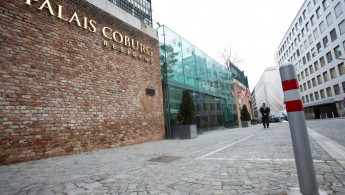Iran nuclear deal: Don't 'exploit' talks for outside reasons, European powers warn
Britain, France and Germany warned on Saturday against moves to "exploit" the Iran nuclear negotiations - a tacit warning to Russia which is accused of delaying an agreement to gain leverage in its invasion of Ukraine.
Negotiators in Vienna said on Friday they had halted talks despite having almost sealed a deal to revive the 2015 Joint Comprehensive Plan of Action (JCPOA) to contain Iran's nuclear activities.
The setback came after Russia said it was demanding guarantees that the Western sanctions imposed on its economy following its invasion of Ukraine would not affect its trade with Iran.
"Nobody should seek to exploit JCPOA negotiations to obtain assurances that are separate to the JCPOA," said a statement on Saturday from the spokespersons for the British, French and German foreign ministries - the three European parties to the negotiations.
"This risks the collapse of the deal, depriving the Iranian people of sanctions lifting and the international community of the assurance needed on Iran's nuclear programme," they added.
The current round of negotiations started in late November in the Austrian capital Vienna between Britain, China, France, Germany, Iran and Russia, with the US taking part indirectly.
After the talks halted on Friday, the United States put the ball in Iran and Russia's court.
"We are confident that we can achieve mutual return to compliance... [if] those decisions are made in places like Tehran and Moscow," State Department spokesman Ned Price told reporters.
Russia's ambassador to the UN in Vienna, Mikhail Ulyanov, told reporters outside the talks venue that he rejected "attempts to put all the blame on the Russian Federation", insisting that other parties to the discussions "need additional time".
Iran's top security official Ali Shamkhani said nuclear negotiations in Vienna 'are becoming more complicated every hour' because of the UShttps://t.co/oD558KZjSr
— The New Arab (@The_NewArab) March 10, 2022
The JCPOA aimed to ensure Iran would not be able to develop a nuclear weapon, which it has always denied seeking.
It unravelled when former US President Donald Trump withdrew from the deal in 2018.
Trump reimposed sanctions on Iran, prompting it to start disregarding the curbs laid down in the deal on its nuclear activity.
"A fair and comprehensive deal is on the table ready for conclusion," the European statement said on Saturday.
"It is our understanding that Iran and the US have worked hard to resolve final bilateral issues and so we are ready to conclude this deal now."





 Follow the Middle East's top stories in English at The New Arab on Google News
Follow the Middle East's top stories in English at The New Arab on Google News
![The UAE is widely suspected of arming the RSF militia [Getty]](/sites/default/files/styles/image_330x185/public/2024-11/GettyImages-472529908.jpg?h=69f2b9d0&itok=Yauw3YTG)
![Netanyahu furiously denounced the ICC [Getty]](/sites/default/files/styles/image_330x185/public/2024-11/GettyImages-2169352575.jpg?h=199d8c1f&itok=-vRiruf5)
![Both Hamas and the Palestinian Authority welcomed the ICC arrest warrants [Getty]](/sites/default/files/styles/image_330x185/public/2024-11/GettyImages-2178351173.jpg?h=199d8c1f&itok=TV858iVg)